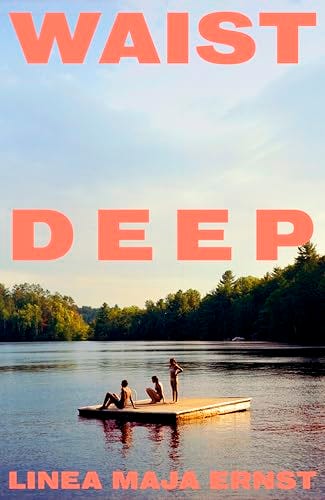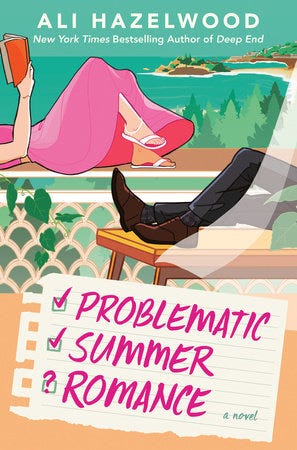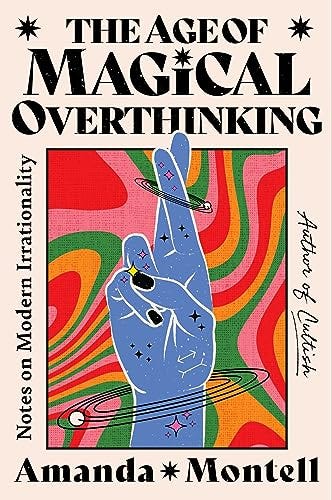June Shelved
Hopeful heartbreak, poetic longing, and just enough romance to keep you texting your situationship: these were the books that carried me through June.
These books reminded me that even the most tangled feelings can lead somewhere soft. June was a month of big emotions, quiet revelations, and stories that left me feeling a little more open to whatever comes next.
Waist Deep by Linda Maja Ernst
I saw a post for this title from the publisher that quoted, “Everyone in this library wants me,” and immediately added to cart. If that doesn’t scream “hot mess summer,” I don’t know what does. I was in the mood for something sexy, chaotic, and smart. Think sunscreen-slicked skin, loaded glances over Aperol spritzes, and a little philosophical dread. Waist Deep delivered.
Set over seven humid, wine-drenched days in the Danish countryside, Waist Deep follows a group of former college friends reuniting after years apart. Once idealistic, bohemian humanities majors with a passion for open love and late-night debates, they’ve since grown up… kind of. There are kids now. Spouses. Google calendars. But also: unresolved tension, existential flirtation, and at least one decades-long crush that could detonate everything.
Messy, magnetic, and just a little unhinged, Waist Deep reads like a group chat that should’ve been left on read. It’s a dreamy, slow-burn spiral into love, identity, and the low-key horror of realizing you’ve maybe, possibly, accidentally grown up. If you’ve ever found yourself tipsy at a wedding wondering if you made the right choices, this one’s for you.
Problematic Summer Romance by Ali Hazelwood
Speaking of being tipsy at a wedding, Ali Hazelwood’s latest delivered exactly what I was craving: simmering tension, summer heat, and a little bit of emotional damage. As a card-carrying member of the “I’ll read anything Hazelwood writes” club, I can confirm Problematic Summer Romance was front and center on my summer TBR, and it did not disappoint.
Maya Killgore is 23, snarky, secretly sentimental, and en route to her older brother’s wedding on the Italian coast. She's also determined to avoid Conor Harkness, a 38-year-old emotionally unavailable millionaire… and her long-time crush. Naturally, he's the best man. Cue: slow glances, barely-contained desire, and a Mediterranean backdrop begging for bad decisions. What follows is a chaotic, delicious slow burn between two people who have absolutely no business falling in love but might be too far gone to stop.
This book has it all: repressed longing, off-limits romance, a wedding setting that begs for drama, and a coastal vibe so vivid you’ll be googling “cheap flights to Amalfi.” If you haven’t yet read Not In Love, it’s worth picking up first for some character context, but Problematic Summer Romance totally holds its own. I inhaled this in one sitting, lights off, phone on Do Not Disturb, and now I’m just sitting here wondering if it’s too dramatic to book a solo trip to Italy in search of my own brooding, older man. (It’s not.)
Talking at Night by Claire Daverley
Is it a love story? Yes. But more than that, it’s about what it means to spend your life searching for the thing, or the person, that might finally make it all make sense. Talking at Night echoes Sally Rooney’s Normal People, but feels more grounded, more hopeful, even through the heartbreak. It’s messy, aching, real. The kind of book that doesn’t just tug at your heartstrings, it frays them.
Rosie and Will meet at a high school bonfire. He’s quiet, haunted. She’s clever, unpredictable. They orbit each other with the kind of chemistry that feels inevitable. Then, tragedy pulls them apart. But life has a way of circling back. They drift in and out of each other’s lives for years: calling late at night, showing up in each other’s dreams, crossing paths at the wrong times. It’s like pushing two swings in sync: they start aligned, fall out of rhythm, then maybe, if everything lines up, find their way back again.
This book was tender, infuriating, and unforgettable. Daverley’s prose is intimate and immersive, and what stayed with me most was how she writes about time: how life keeps moving between moments, even when people don’t. That ache of distance, of near-misses, feels all too real.
It’s what we do with our time that matters, and where we end up in the end that counts.
I read most of this on the subway with my headphones in, nothing playing. I had to pause just to breathe. It wrecked me, in the best way. And yes, I’ll be pressing it into every friend’s hand saying: “It’ll destroy you. You absolutely have to read it.”
A Separation by Katie Kitamura
If you’re craving a messy, quasi-romance where a lot happens but it somehow feels like nothing at all, A Separation might be your perfect summer read.
The narrator (unnamed, emotionally detached, and quietly separating from her husband of five years) gets a call from her mother-in-law. Her husband has been unreachable for weeks, and she insists the narrator travel to Greece to find him. Though they haven’t spoken in over a month, she agrees, flying to a rugged coastal town where she spends her days swimming, dining alone, and observing more than acting. Then, an unexpected tragedy shifts everything.
Still legally married, she finds herself performing grief for someone she was estranged from, navigating the ambiguity of their relationship and the strange intimacy of being the person expected to mourn him.
What struck me most was that the narrator is a translator of fiction. Her profession carries over into how she interacts with the world, the events of the novel seem to unfold through her rather than happen directly to her. Her emotions often mirror those around her, adding layers of detachment and performance. Kitamura has a talent for writing women on the edge, and A Separation captures that gray area between obligation, identity, and unraveling with precision.
The Age of Magical Overthinking by Amanda Montell
I’ve had this book on my shelf for a while, and June book club was the perfect excuse to dive in. I studied Psychology in college, so exploring thinking patterns, cognitive biases, and how our tech-saturated environment fuels them was definitely up my alley.
Montell delves into a variety of social phenomena that have emerged in our culture due to the rise of technology and the interconnectedness of social media. She covers topics ranging from the recency illusion to the sunk cost fallacy. I loved the blend of psychological insight and cultural critique, and I’d recommend this book to anyone trying to make sense of today’s world through clear definitions and thoughtful analysis.
My favorite chapter was toward the end, titled “The Magic of Becoming a Mediocre Crafter,” focuses on the joy and mental clarity that comes from using our hands: activities like crocheting, painting, or sculpting. I picked up crocheting a couple of years ago, and the hobby instantly boosted my mood and gave me a way to focus on something other than a screen.
My favorite line from that chapter was:
“Adorably, [a Norton] study found that after completing their origami and Lego structures, participants expressed a desire to show them to their friends… This is even and especially true when the creation didn’t turn out quite as planned.”
Put the phone down, escape into the beauty of the real world, and maybe don’t overthink it. We can’t always control where our minds go (sometimes down anxious rabbit holes) but we can find small ways to navigate out of them. From my experience, a ball of yarn and a crochet needle is a great place to start.
And that concludes the books I shelved in June. Thank you for reading and keep an eye out for the July newsletter for our next book club announcement, book events to attend next month, and more!











adding waist deep & talking at night to my tbr immediately!
Talking at night is one of my all time faves!